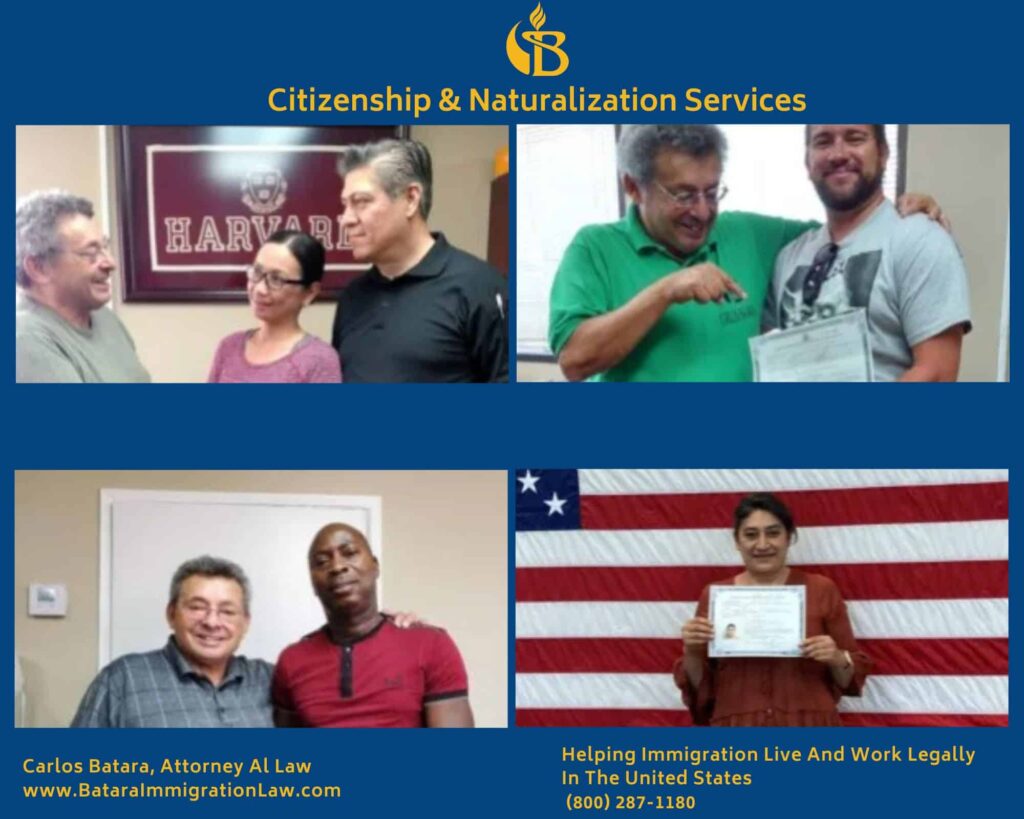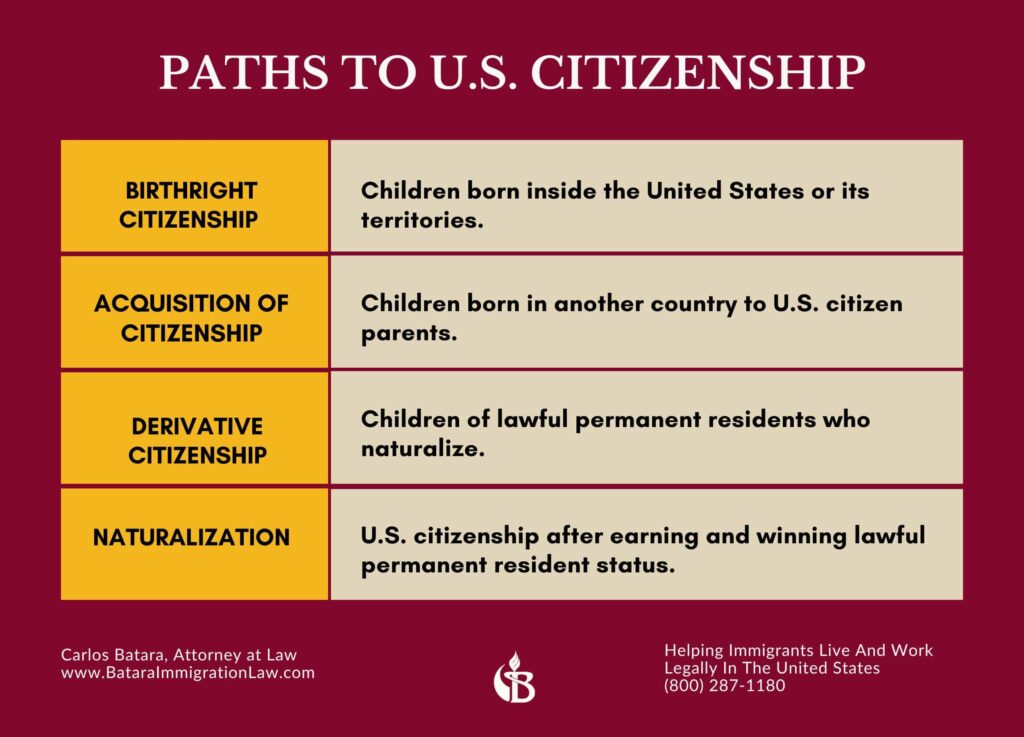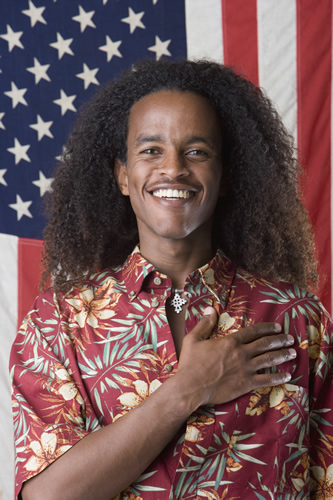Trusted legal counsel for individuals and families seeking U.S. citizenship through birth, parents, or the naturalization process.

Becoming a United States citizen is one of immigration law’s most significant milestones. It provides long-term security, new rights, and a stable foundation for individuals and families to build their futures.
U.S. law recognizes multiple ways for a person to become a citizen.
Some individuals are citizens at birth. Others, born outside the United States, may qualify through a U.S. citizen parent or through a parent’s naturalization.
Lawful permanent residents can pursue naturalization after meeting residence, travel, good moral character, and other eligibility requirements.
Each pathway has its own requirements, timelines, and evidence standards.
Applying for citizenship is not a process to take lightly. Even those who appear eligible on paper may face setbacks if potential issues are not carefully addressed in advance.
The sections below explain the key ways to claim U.S. citizenship, common eligibility concerns, and how to approach the process wih clarity and confidence.
If You’re Thinking About Becoming A United States Citizen . . .
We’ll Help Guide Your Journey To Success
When most immigrants think of becoming a U.S. citizen, they presume that naturalization is their only path forward. Upon closer inspection, several learn they might have been eligible long ago but were unaware of their options:
- Were you born in the United States but have not been able to prove your citizenship?
- Were you born in another country and one of your parents was a U.S. citizen?
- Were you a permanent resident under the age of 18 when your parent became a U.S. citizen?
- Are you now a permanent resident and ready to take the next step?
Any of these options can open the door to U.S. citizenship for you.
When you become a citizen, you will have reached the final step – the final frontier – of your immigration journey.
You will be entitled . . . finally . . . to the full benefits of life in the United States.
This includes the ability to travel and visit loved ones freely. To work for state and national government offices. To buy a house in a better neighborhood
And build long-term economic security for your loved ones and family.
So why delay?
Table Of Contents
- What Are The Four Ways To Win Citizenship And Naturalization?
- Birthright Citizenship: Persons Born In The United States
- Acquisition Of Citizenship: Citizens Born In Other Countries
- Derivative Citizenship: Children Of Lawful Permanent Residents Who Naturalize
- Naturalization: The Final Frontier For Lawful Permanent Residents
- What Are The Benefits Of U.S. Citizenship?
- Obstacles To Winning Naturalization
- Good Moral Character
- Disruption Of Continuous Residence
- Arrests And Convictions
- Concealing Or Falsifying Information
- Special Naturalization Rules
- Expedited Naturalization Through Military Service
- Language And History Test Exemptions For Seniors
- After Winning Permanent Residence, When Can Immigrants Apply For Naturalization?
- What Happens If Your Naturalization Application Is Denied?
- Now It’s Your Turn To Join The Family Of United States Citizens
What Are The Four Ways To Win Citizenship And Naturalization?
There are four separate paths to U.S. citizenship:

- A. Citizenship through Birth – Children born inside the United States or its territories
- B. Citizenship through Acquisition – Children born in another country to U.S. citizen parents
- C. Citizenship through Derivation – Children of lawful permanent residents who naturalize
- D. Citizenship through Naturalization – U.S. citizenship after earning and living in permanent resident status
Each of these paths has its own set of requirements. Each poses unique challenges for immigrants seeking to become full fledged citizens.
The first three ways provide citizenship automatically if the child of the United States citizen can produce the requisite documents. The fourth, naturalization, is subject to a wider range of statutory and discretionary bars before the government will approve the application.

A. Birthright Citizenship:
Persons Born In The United States
You probably think this category seems strange. “If a person is born in the United States,” you wonder, “aren’t they automatically U. S. citizens?”
Well, as a immigration lawyer, I’ve learned it’s not always that straight-forward – especially if the parents are not U. S. citizens or lawful permanent residents.
Citizenship Case Example Number One: Can The Child Of An Immigrant Born Via Midwife Services Inside The U.S. Prove Birthright Citizenship?
One evening, on his way to a football game in Moreno Valley, James was picked up when the driver made a rushed right turn. James did not have any documents to prove citizenship. The officers turned him over to immigration agents. A few weeks later, a judge ordered him deported.
He visited our Hemet citizenship law office. Talking with James, we learned he was born in the United States. But he was not born in a hospital. A midwife and a priest helped his mother give birth. She could not afford medical care. She returned to her home country soon after. James was left behind and raised by his aunt and uncle in the U.S. They never registered his citizenship.
James, now 25, faced expulson to a country he had never seen. The immigration judge did not believe his birth by midwife citizenship claim. We advised James he could still fight back but it would not be simple.
James would need to get strong evidence from his family to prove he was a citizen. The family had lost contact with his mother. He would have to try everything possible to locate her. The priest had remained lifelong friends with the family, a good starting point.
James would need to file an immigration appeal to keep his hopes alive while he battled to prove his birthright citizenship.
Three years later, James prevailed.
Most recently, those against immigration have started a drive against certain children born in the U.S. They argue that children, born to parents without legal documents, should not be entitled to citizenship by birth.
They seek to hijack the constitutional meaning of citizenship through the use of misleading and pejorative terms like anchor babies.
Birthright citizenship, over the years, have been granted to various countries that were once “territories” under U.S. rule. This includes Puerto Rico and Guam. Today, the one territory still lacking birthright citizenship privileges is America Samoa.
B. Acquisition Of Citizenship:
Citizens Born In Other Countries
If you were born in another country, and at least one of your parents was a U. S. citizen, you may qualify as a U. S. citizen by birth.
This process is called “acquisition of citizenship.”
Citizenship Case Example Number Two: If A Child Of A U.S. Citizen Parent Is Born In Another Country, Is She Entitled To Citizenship?
Sheryl’s mother, Elia fell in love with Miguel shortly after high school. Elia was born and raised in San Diego County. Miguel lived in Mexico. During their courtship, Elia continued to live and work in National City. She would travel back and forth on the weekends to be with Miguel.
About two years later, Sheryl was born in a Mexican hospital. Elia brought her to the United States. She never filed papers to show Sheryl’s citizenship. It was not an issue until after Sheryl graduated from high school. Seeking employment, Sheryl needed to prove her U.S. citizenship.
Sheryl and her mother went to an immigration services specialist. The specialist filed papers on Sheryl’s behalf. The government denied her application. Sheryl felt lost. She could not work legally in the U.S. She feared being deported someday.
When they came to our San Diego immigration law office, they feared Sheryl’s case was over. They believed they had no options.
We explained they could start over again.
To begin, we needed to get Sheryl’s complete immigration file from the government. We wanted to study what went wrong with her first set of citizenship papers. This was crucial for various reasons.
We wanted to ensure we could explain any mistakes made in the earlier filing. We wanted to prevent fraud charges against Sheryl and her mother due to such mistakes.
Once we obtained the records, it was full speed ahead. Sheryl was able to prove she was a United States citizen.
Proving that citizenship has been acquired can be complicated.
The rules have changed often. For instance, a person born before January 14, 1941 but before December 24, 1952 has different requirements than a person born after December 24, 1952 but before November 14, 1986.
Moreover, a person who was born to a U.S. citizen mother has different guidelines to follow than a person born to a U.S. citizen father. Whether the parents were married at the time of the individual’s birth also affects what evidence must be proven.
C. Derivative Citizenship: Children Of Lawful Permanent Residents Who Naturalize
Third, if you are a lawful permanent resident when your parent naturalizes, you may be eligible to become a U. S. citizen through a process known as “derivation of citizenship.”

As with acquisition, the laws regarding derivation of citizenship depends on when you were born and what law was in effect at that time.
D. Naturalization: The Final Frontier For Lawful Permanent Residents
Fourth, you can earn U. S. citizenship through the naturalization process.
This is the most commonly known path to full legalization.
Naturalization is the final step for immigrants in the family unity process after they have earned lawful permanent resident status.
Citizenship Case Example Number Three: Why Is Naturalization A Difficult And Scary Process For Many Law-Abiding Immigrants?
For over 20 years Jane, who now lived in San Bernardino, had been a lawful permanent resident. She wanted to become a U.S. citizen. She delayed for two reasons. First, she felt like she was betraying her home country, Guatemala. Second, she was very, very afraid of the naturalization process.
When she lived in Riverside, Jane’s first efforts to become a permanent resident had failed. Even though she later earned a green card through the same immigration program, that experience scarred her. She vowed to never go through the immigration process ever again.
But her dream to become a U.S. citizen never died. She was proud to live here. She was proud of the many benefits she gained by living in the U.S. legally. And she knew the benefits of becoming a U.S. citizen were even greater.
After three meetings with Carlos, she put aside her fears. She decided to take the next step – to move from permanent resident status to full legalization and citizenship.
Today, Jane is a naturalized citizen.
What Are The Benefits Of U.S. Citizenship?
If you’re like a lot of our immigration naturalization law office clients, you may want to know why you should apply for citizenship.
Here’s why. If you are granted citizenship, under any of the four categories listed above, you gain the right to:
- Vote in U. S. elections for government officials
- Help immigrate certain relatives to the U.S., often more quickly than if you are just a lawful permanent resident
- Travel outside the U. S. with a U. S. passport wherever and whenever you want
- Run for public office (except President and Vice-President)
- Increased protection from deportation and removal
- Seek government benefits, and various scholarships and grants
- Live in another country without losing your right to return to the United States
Obstacles To Winning Naturalization
Winning naturalization is not simple. Requirements like good moral character and continuous residence are trickier than applicants anticipate.
Here are the most common barriers to success.
- Good Moral Character
- Disruption Of Continuous Residence
- Arrests And Convictions
- Concealing Or Falsifying Information
Good Moral Character
Many permanent residents take the naturalization process too lightly.
They assume five years of permanent resident status, with no convictions during that period, is an assurance of naturalization success.
They’re wrong.
A small mistake many years ago can destroy your chances of success. A conviction, even for a minor offense, may become a significant impediment to winning your case.
The government’s review for good moral character is wider than just an analysis of convictions.
Even mere allegations of certain types of convictions and past restraining orders might become major barriers to obtaining naturalized citizenship status.
Past marriages, and children born with multiple husbands and wives abroad prior to becoming a permanent resident, are ripe for deeper questioning by examiners.
Equally significant, USCIS officers often scrutinize naturalization applicant’s actions, like a failure to pay child support, use of publc benefits, inaccurate tax returns, or completion of probation, beyond the most recent five years.
Disruption Of Continuous Residence
To qualify for naturalization, immigrants must reside in the U.S. for a period of five years following the grant of permanent resident status. They must prove that during this period, they did not disrupt their residence in the United States.
This is an issue who have went abroad for several months. Visits abroad fo six months are permissible. However, if the trips lasted more than six months, it may be consided a disruption of residency.
If a naturalization applicant has stayed away from the U.S. for more than 12 months, the absence be deemed an abandonment of residence, which could lead to the loss of his or her green card status.
Arrests And Convictions
Sometimes it is a colossal mistake for immigrants to apply for citizenship.
Let me repeat that.
Sometimes it is a collossal mistake for immigrants to apply for citizenship.
Applicants for naturalization often jump the gun and apply for citizenship without verifying their eligibility. By the time they arrive at our immigration office, it’s simply too late to help them.
If any of the above situations potentially apply to you, you should consult with a citizenship attorney versed in the immigration consequences of convictions and arrests BEFORE you file any papers.
Such rules are strict. For instance, many immigrant veterans have been deported, even though they were supposedly on a track to expedited military citizenship, due to post-service offenses.
In some cases, individuals arrested are entitled to citizenship through a grandparent’s citizenship, because a claim of citizenship was skipped for an entire family generation.
Even if the allegations against you were false, or if the charges were dropped, you could still face stern roadblocks during the naturalization process. They may instigate a good moral character investigation.
You don’t want to take unnecessary risks. You don’t want to take chances that your case might be sent to Immigration Court. You don’t want to face deportation charges filed by the government.
Concealing Or Falsifying Information
Instead of consulting with a citizenship attorney to discuss potential problems, some immigrants try to hide information from the government.
They think once they obtain citizenship, they’re safe from deportation. This is not true.
Falsifying information places immigrants in greater jeopardy.
If their deceit is discovered, the government can press criminal charges and begin the denaturalization process, stripping their citizenship status which leads to deportation.
Recommended Reading:
Citizenship, War Criminals, And Immigration Fraud
What Is The Citizenship Of A Baby Born In Airspace?
Citizenship Through Grandparents: The Doctrine Of Constructive Retention
Special Naturalization Rules
Special citizenship rules exist for immigrants who join the military and elderly immigrants. These rules simplify the naturalization requirements for them.
Expedited Naturalization Through
Military Service
When immigrants join the armed forces, they are allowed to seek expedited military citizenship.
Those who serve during a period of peacetime are eligible to apply for naturalization after one year. Those who serve honorably during a period of hostility are eligible after only one day of honorable service.
Naturalization through military service is not automatic. Applicants must still meet various other requirements to be granted U.S. citizenship.
Language And History Test
Exemptions For Seniors
It’s never too late to become a U.S. citizen.
Winning U.S. citizenship in your 50s, 60s, 70s, and 80s is possible – and you might qualify for some special rules.
For instance, there are two separate rules that allow older permanent residents to bypass the English requirement – that is, from having to prove the ability to read, write, and speak words in ordinary usage.
If you’re older than 50 and have lived in the U.S. as a permanent resident for 20 years, you qualify to take the citizenship interview in your native language. This is known as the “50/20” waiver.
If you’re older than 55 and have lived in the U.S. as a permanent resident for 15 years, you qualify for the “55/15 English language waiver.
These waivers, however, do not exempt a older applicant from taking the history and government examination in English. But an easier test with less questions is given to seniors 65 and older who have been green card holders for 20 years.
The belief that it is never too late to apply for citizenship was reinforced by a recent story written for the Seattle Times.
The story covers the naturalization of Maria Ramirez Perez, a woman in her later 80s.
On Christmas Day 1929, Ms. Ramirez was born in a small, poverty-stricken town in rural Mexico. She did not attend school and never learned to read. Yet, on December 11, 2017, she was sworn in as a U.S. citizen at the of age of nearly 88.
Winning U.S. citizenship in your 50s, 60s, 70s, and 80s is possible (and you might qualify for some special rules.)
The road to citizenship success is rarely simple. For seniors, it’s often more perilous. But like Ms. Ramirez, it is possible.
After Winning Permanent Residence, When Can Immigrants Apply For Naturalization?
Generally, if you have been a lawful permanent resident for five years, you can apply to become a naturalized U.S. citizen. But if you were granted a green card based on marriage to a U.S. citizen, then you can apply after three years.
What Happens If Your Naturalization Application Is Denied?
If your application for U.S. citizenship is denied, you have the right to request a hearing with a higher immigration officer. This request is often called an “administrative appeal” .
Your request must be made within 30 days after your application is denied. You are entitled to submit new evidence to support your application.
Instead of filing an appeal, you can simply re-apply, submitting a new application and paying the filing fees again.
Now It’s Your Turn To Join The Family Of
United States Citizens
Becoming a U. S. citizen is the end of a long journey.
To get where you’re at today, the road may have been bumpy. Most likely, the bumpier the road, the greater your hesitation to file new immigration papers.
We understand those bumps. We understand your fears. We also understand your dreams.
For over 30 years, we have helped immigrants win U.S. citizenship, no matter where they live, via our online and virtual immigration office.
And if you live in the Southern California region, we offer direct, in-person help at our various locations.
No matter where you live, in California, another state, or another country, we can guide you through the process.
So why delay?
Additional Immigration Services
For an overview of all immigration matters we handle, in addition to our citizenship and naturalization services, visit our Immigration Legal Services page.
Helping Clients Pursue U.S. Citizenship Across Hemet And The Inland Empire
Becoming a U.S. citizen is a life-changing milestone that brings new rights, security, and opportunity.
Multiple pathways can lead to citizenship. You may qualify through naturalization, through a parent, or by obtaining proof of existing citizenship status.
Our office can help you navigate the legal steps to citizenship, whichever path you pursue, through our regional service hubs:
No matter where you live, we are committed to helping you secure U.S. citizenship, along with all the rights and protections such status confers.
Many clients also choose to work with our office remotely through our Virtual Immigration Law Office, allowing individuals and families across California and the United States to receive experienced immigration representation without needing to travel in person.
Ready to take a serious look at the strengths and weaknesses of your citizenship case? Let’s schedule your personalized strategy and planning session today.




